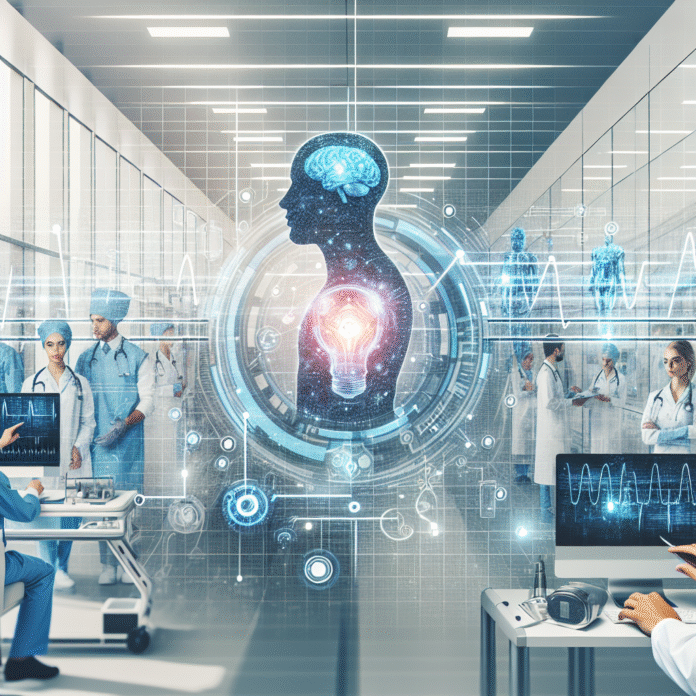Introduction
The intersection of artificial intelligence (AI) and healthcare is revolutionizing the medical landscape, enhancing how diseases are diagnosed, managed, and treated. With advancements in machine learning, natural language processing, and data analytics, AI is becoming an indispensable tool for healthcare professionals. This article explores how AI is transforming diagnostics and patient care, showcasing its potential benefits and ethical considerations.
Transforming Diagnosis
Enhanced Diagnostic Accuracy
One of the most significant benefits of AI in healthcare is its ability to improve diagnostic accuracy. Traditional diagnostic methods can sometimes rely heavily on human interpretation, which is subject to errors due to fatigue, bias, and variability among practitioners. AI algorithms, trained on vast datasets, can analyze medical images (e.g., X-rays, MRIs, CT scans) with remarkable precision. For instance, AI systems like Google’s DeepMind have shown promise in detecting eye diseases and cancers earlier than human experts.
Predictive Analytics
AI tools can predict patient outcomes and disease progression by analyzing historical patient data, current health metrics, and genetic information. For example, predictive models can forecast the likelihood of developing chronic diseases, enabling preventive measures and personalized treatment plans. This shift from reactive to proactive healthcare demonstrates how AI can significantly reduce morbidity and mortality rates.
Faster Diagnoses
Time is critical in healthcare, particularly in emergencies. AI applications can process vast amounts of data quickly, leading to faster diagnoses. For instance, AI-driven chatbots and virtual assistants can triage patients based on symptoms, directing them to appropriate care channels and expediting the entire process.
Improving Patient Care
Personalized Treatment Plans
AI algorithms can analyze individual patient data, including genetic profiles, lifestyle factors, and treatment histories, to develop personalized care plans. This transition towards precision medicine ensures that patients receive treatments tailored to their unique needs, resulting in better outcomes and adherence to treatment protocols.
Virtual Health Assistants
AI-powered virtual health assistants, such as chatbots and mobile applications, empower patients to manage their health better. These tools can provide medication reminders, health tips, and basic triage, fostering patient engagement and adherence to treatment plans. Additionally, they can alleviate the burden on healthcare providers by addressing common patient inquiries.
Remote Monitoring and Telehealth
The rise of telehealth solutions, bolstered by AI technology, has made healthcare more accessible. Remote monitoring devices equipped with AI can track patients’ vital signs and health metrics in real-time. This data can be analyzed to identify potential health issues before they escalate, allowing for timely interventions. The integration of AI into telehealth services ensures that patients receive continuous care, regardless of their location.
Ethical Considerations
While the benefits of AI in healthcare are substantial, ethical considerations must be addressed. Issues surrounding data privacy, algorithmic bias, and the potential for AI to replace human jobs raise important questions. Ensuring that AI systems are developed with transparency, accountability, and inclusivity will be crucial in gaining public trust and ensuring equitable access to these technologies.
Data Privacy and Security
The use of patient data is at the core of AI applications in healthcare. Safeguarding this information must be a top priority to build trust among patients. Strong regulatory frameworks and robust security measures are essential to protect sensitive data from breaches and misuse.
Addressing Bias
AI systems can inadvertently learn and perpetuate biases present in training data, leading to disparities in healthcare outcomes. Vigilant monitoring, diverse datasets, and continuous evaluation of AI algorithms are vital to mitigate bias and ensure that AI tools serve all patient populations fairly.
Conclusion
AI is not merely a technological trend; it is a transformative force reshaping the healthcare landscape. By enhancing diagnostic accuracy, enabling personalized treatment plans, and improving patient care, AI has the potential to revolutionize how healthcare is delivered. However, it is crucial to navigate the ethical complexities and ensure that advancements benefit all patients equitably. As AI continues to evolve, its role in healthcare will only expand, paving the way for a more efficient and responsive healthcare system.






